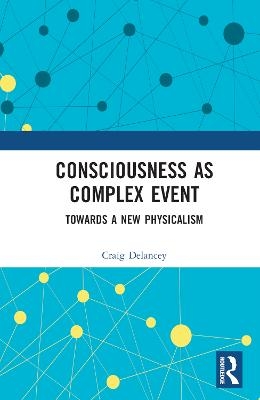
Consciousness as Complex Event
Towards a New Physicalism
Seiten
2022
Routledge (Verlag)
978-1-032-33450-9 (ISBN)
Routledge (Verlag)
978-1-032-33450-9 (ISBN)
Provides a new approach to the study of consciousness. The author argues that what makes phenomenal experiences mysterious is that these experiences are extremely complex brain events.
Consciousness as Complex Event: Towards a New Physicalism provides a new approach to the study of consciousness. The author argues that what makes phenomenal experiences mysterious is that these experiences are extremely complex brain events. The text provides an accessible introduction to descriptive complexity (also known as Kolmogorov Complexity) and then applies this to show that the most influential arguments against physicalism about consciousness are unsound. The text also offers an accessible review of the current debates about consciousness and introduces a rigorous new conception of physicalism. It concludes with a positive program for the future study of phenomenal experience. It is readable and compact and will be of interest to philosophers and cognitive scientists, and of value to advanced students of philosophy.
Key Features
Provides a new approach to the study of consciousness, using information theory.
Offers a valuable discussion of physicalism, of use in other disciplines.
Contains an introduction to the main literature and arguments in the debate about consciousness.
Includes an accessible overview of how to apply descriptive complexity to philosophical problems.
Consciousness as Complex Event: Towards a New Physicalism provides a new approach to the study of consciousness. The author argues that what makes phenomenal experiences mysterious is that these experiences are extremely complex brain events. The text provides an accessible introduction to descriptive complexity (also known as Kolmogorov Complexity) and then applies this to show that the most influential arguments against physicalism about consciousness are unsound. The text also offers an accessible review of the current debates about consciousness and introduces a rigorous new conception of physicalism. It concludes with a positive program for the future study of phenomenal experience. It is readable and compact and will be of interest to philosophers and cognitive scientists, and of value to advanced students of philosophy.
Key Features
Provides a new approach to the study of consciousness, using information theory.
Offers a valuable discussion of physicalism, of use in other disciplines.
Contains an introduction to the main literature and arguments in the debate about consciousness.
Includes an accessible overview of how to apply descriptive complexity to philosophical problems.
Craig DeLancey is Professor of Philosophy at the State University of New York. He is the author of Passionate Engines: What Emotions Reveal and Mind and Artificial Intelligence (2001) and A Concise Introduction to Logic (2017).
1. Complexity in Mind, 2. The Inadequacy Claims, 3. Strong Physicalism, 4. Refuting the Anti-Physicalist Arguments, 5. Subjectivity and the Sample Bias, Afterward: Consciousness as Complex Event
| Erscheinungsdatum | 26.08.2022 |
|---|---|
| Verlagsort | London |
| Sprache | englisch |
| Maße | 152 x 229 mm |
| Gewicht | 453 g |
| Themenwelt | Geisteswissenschaften ► Philosophie |
| Geisteswissenschaften ► Psychologie ► Allgemeine Psychologie | |
| ISBN-10 | 1-032-33450-9 / 1032334509 |
| ISBN-13 | 978-1-032-33450-9 / 9781032334509 |
| Zustand | Neuware |
| Informationen gemäß Produktsicherheitsverordnung (GPSR) | |
| Haben Sie eine Frage zum Produkt? |
Mehr entdecken
aus dem Bereich
aus dem Bereich
Techniken der Verhaltenstherapie
Buch (2024)
Julius Beltz GmbH & Co. KG (Verlag)
CHF 48,95


